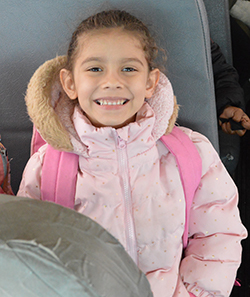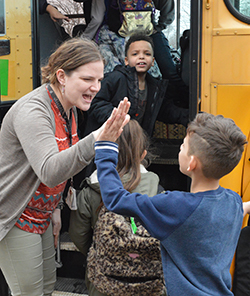Four buses roll up to Gladiola Elementary at 3:30 p.m. to pick up kindergarten through fourth graders and begin the after-school route taking them home.
The final bell has rung, and students walk outside in single file lines, high-fiving teachers as they board their buses. Principal Cheryl Corpus gets on the bus, driven by Diane Kallemeyn, with a crew of talkative, energetic students. She ushers each to their seats, making sure they are settled in and ready to go.
Students know the mantra for good bus riding. It’s the same one they use all day long, in classes, in the hallways and at recess: “Be safe, respectful and responsible,” said third grader Kamar Woods, who rides the bus to school and home.

Kamar said his bus driver, Kammy Legg, makes him smile. She always says nice things and gives students Halloween treats and chocolate Easter eggs, he said.
Corpus and Gladiola staff members made a concerted effort this school year to carry the district’s Positive Behavioral Interventions & Supports system — an approach to addressing behavior through social, emotional and behavior support — onto the bus.
PBIS at Gladiola, in its first year of full implementation, is referred to as “Glad to Be” and involves staff and students using common language and lingo around behavior expectations. There are monthly incentives and prizes for going above and beyond expectations.
Corpus saw a need to extend “Glad to Be” into the morning and afternoon bus rides. Helping students board and get seated each day is just one way she’s helping do that.
“The bus is where a lot of our students struggle,” she said. “The students needed to understand that the bus is an extension of the school day.”
Fourth grader Mauricio Pelayo knows what that means: “No eating. No moving seats while on the bus. No talking back.”
Why?
“Because if we aren’t safe, responsible and respectful, people can get hurt,” said first grader Xavier Mata-DeLeon.

Along for the Ride
Corpus and the school’s PBIS team, including social worker Amy Hendrickson and student advocate Fritz Bowerman, brainstormed how to zero in on bus behaviors.
They go on full-route ride-alongs to monitor student behavior each quarter or when problems arise. “We have found that those rides are an extra 20 minutes of our day, but it has such a payoff in the moment and long term,” Corpus said. “You just get to see the kids in a different way and meet the families.”
They created more regular and open dialogue with drivers, who pass out Wolf Tags, which are paper rewards for students who exhibit good behavior to save up and spend on prizes.
“It’s really exciting to see the relationships the bus drivers build with the kids when they hand (them) out or get to know our students,” Corpus said.
Hendrickson said she’s learned a lot from drivers about students she works with, because of the open dialogue that’s resulted from ride-alongs and other communications. That helps her in her job as a social worker. “I appreciate that our bus drivers know our kids’ stories,” she said.

The Result
Discipline data has gone down on the bus, Corpus said.
Drivers said the efforts have made their routes go more smoothly and things are more organized and calm. Kallemeyn, who is in her sixth year driving the bus, said students are aware that “as long as you’re on the bus,” it’s still school time.
“It has sped up the process immensely,” she said.
Bus driver Kenn Davis said he appreciates the time spent reminding students of expectations. “I can pay more attention to traffic. We have seven mirrors and 50 kids to watch. That can be hectic.”
Corpus said students, staff and drivers know embodying “Glad to Be” is full time.
“From the morning to the end of the day, you are part of our Gladiola community, whether on the bus or at home,” she said.









